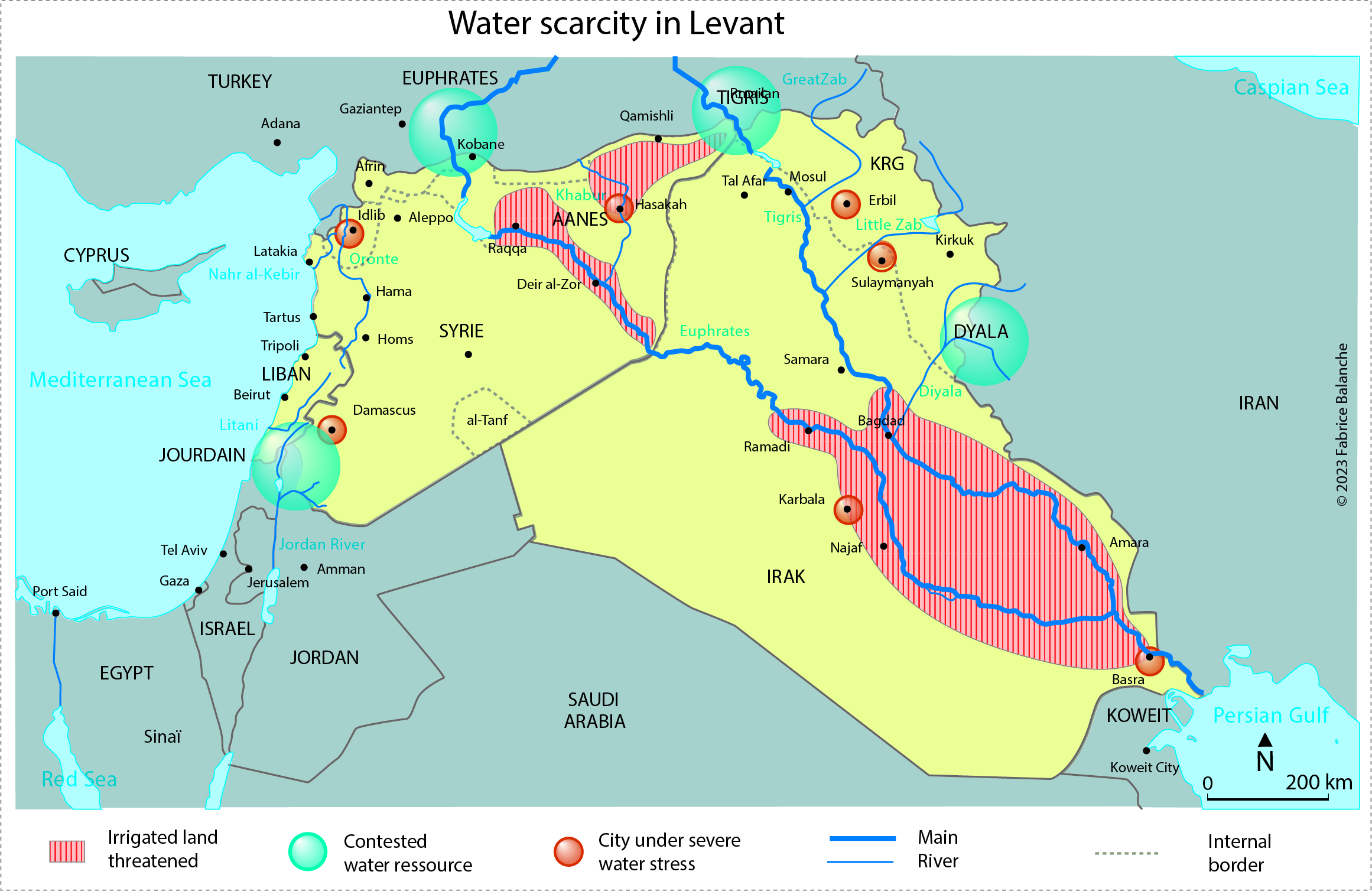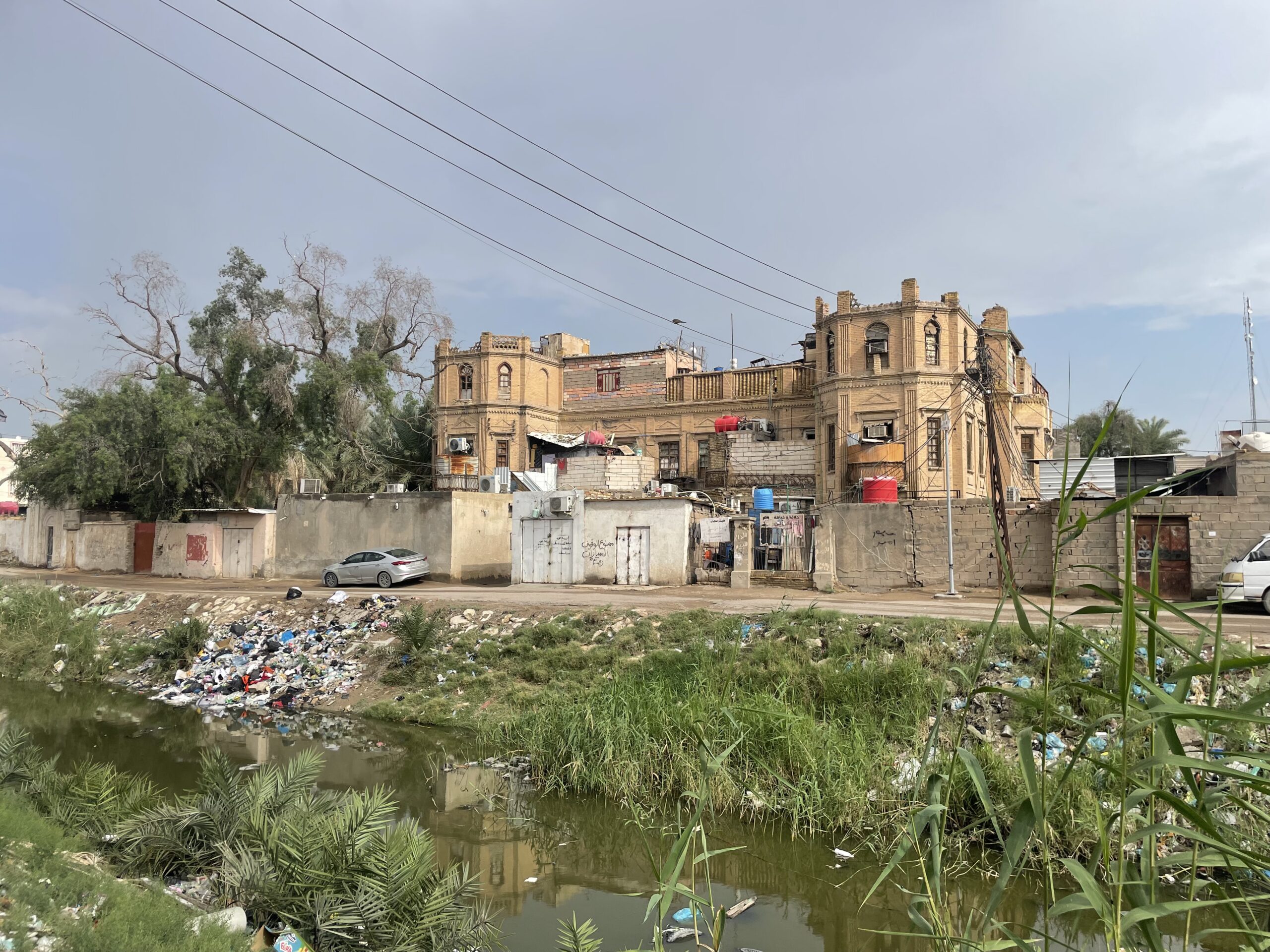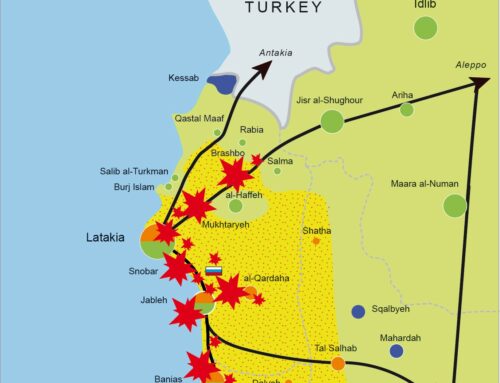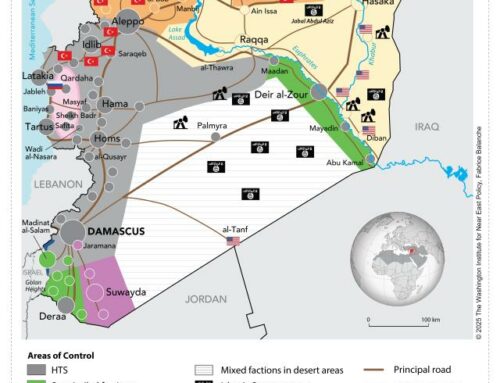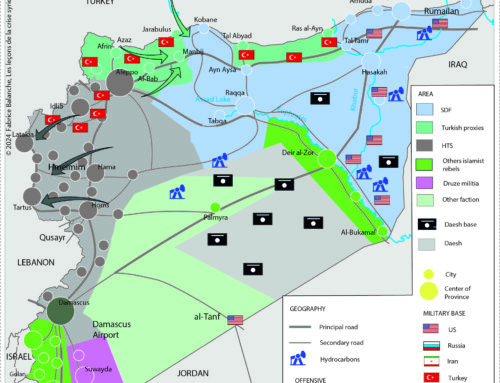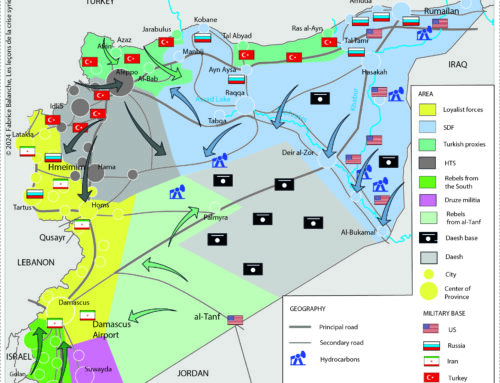Drawing on his field-research and experience following the recent international symposium in Erbil: ‘Drought, and the Impact of Climate Change on the Political, Economic, and Demographic Situations of Iraq’, Fabrice Balanche presents his analysis of demographic movements in Iraq in relation to climate change. Published on CFRI, 17th May 2024.
Migration and global warming in Iraq
In a 2023 report, the World Bank states that Iraq is the fifth most affected country in the world by global warming; temperatures rise above 50 degrees for long weeks in summer and water availability has plummeted over the last twenty years from more than 2,000 ㎥ per capita per year to less than 500 ㎥ today. Precipitation is constantly decreasing, and notably, the retention dams in Turkey and Iran have seriously reduced the flow of the Tigris, the Euphrates and their tributaries such as the Diyala river. It should also be pointed out that Iraq’s needs are growing, with its population rising from 20 million in 1994 to almost 45 million in 2024, and is expected to reach 80 million in 2050. Food dependency and the cost of resisting global warming could rapidly become unsustainable, despite the country’s wealth in hydrocarbons, triggering major internal migrations.
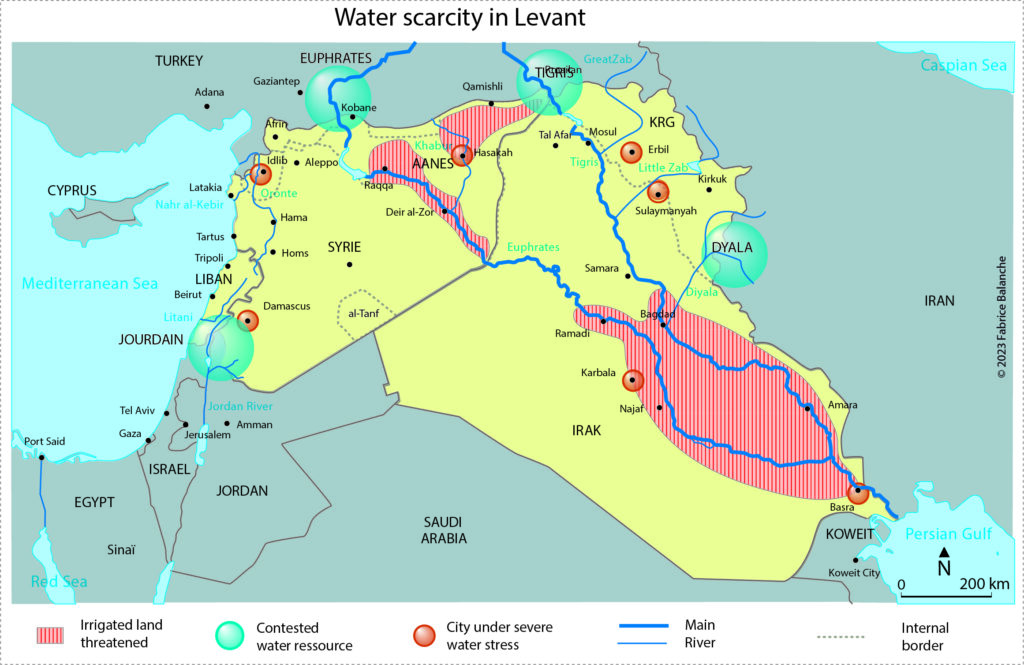
Water scarcity in Levant. Fabrice Balanche
Unsustainable solutions to Global warming
Iraq no longer produces its own food; instead, it imports it thanks to the resources provided by oil exports. With production approaching 5 million barrels a day, the country can now afford to generate abundant, low-cost electricity which enables people to buy air conditioners. Despite being surrounded by pockets of poverty, most homes in metropoles are equipped with these units. This is the solution to summer heat in Qatar, the United Arab Emirates and many other countries with arid and semi-arid climates. In these conditions, there is no point in using insulating materials. In fact, in some places, where electricity is free, people do not bother to close doors and windows when the air conditioning is running.
In the summertime, the wealthiest people leave for Europe, Turkey and other places where the heat of the Mesopotamian plains is not so intense. During these months, Iraqis also come to the Kurdistan region. Part of the property development is linked to this search for pleasant weather by those living in central and southern Iraq. Iraqis who do not have the means to leave the country enjoy Kurdistan for its relatively mild climate, its landscapes and the freedom it offers in contrast to the rigorism that prevails outside the autonomous region. Their dream is to own a flat there, where they can spend their holidays and retirement.
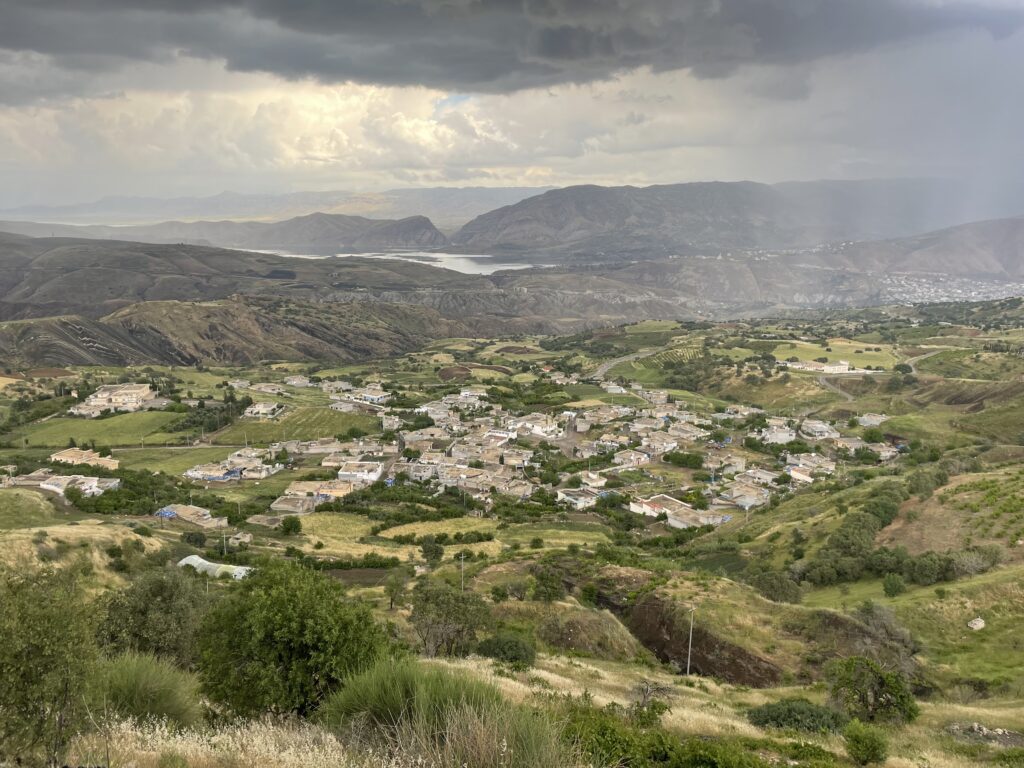
Dukan, Kurdistan of Irak, Fabrice Balanche 2024
In addition to internally displaced people, Kurdistan has seen a massive influx of domestic tourists since 2014. However, it has not yet experienced a wave of ‘climate’ refugees, since the rentier state has the financial resources to keep Iraqis in place. Nevertheless, it is questionable whether the Iraqi government will be able to continue this generous policy in the future. Even in Gulf countries such as Saudi Arabia, the welfare state is being reconsidered, as the exorbitant cost of supporting 45 million citizens has become increasingly expensive. Furthermore, in Iraq, will the electricity network be able to manage with the explosion in demand? It is dilapidated, and unlawful connections are creating numerous malfunctions. A giant blackout at the height of summer cannot be ruled out. This will lead to a mass exodus of people to the Kurdish mountains, even if it means sleeping in the open air, as a resident of Basra explained to me during the 2018 heatwave.
Agricultural collapse in the South
Southern Iraq used to be a garden, but now many irrigated areas have been reduced to barren wasteland. The current submersion technique has sterilised the fields by raising the salt level. Above all, there is not enough water to nourish the crops, and traditional irrigation is too expensive. It takes 7 ㎥ for a plant to absorb 1 ㎥, with the rest evaporating away in arid areas. Up to 90% of the water entering Iraq’s irrigation system is lost due to leakage in canals and evaporation from reservoirs. What’s more, it can only work in a hyper-centralised structure where farmers fear the State. This was the case during the Baath period, when it was built. Today, however, there is no authority to control the water turns, drain the soil in winter and regulate consumption in order for the water to reach the extremities of the vast irrigated perimeter. The farmers help themselves upstream whereas the downstream areas are no longer supplied. The more powerful are stealing the resources from the weaker ones. Poor management and a lack of civic-mindedness are just as responsible for the failure of the irrigation system as is the shortage. The latter exacerbates the phenomenon, because scarcity encourages conflicts over use. Furthermore, the Iraqi state does not protect its agricultural production against foreign competition. Turkish and Iranian goods are flooding the market at lower prices, threatening the viability of agriculture in the south. Finally, young people are more attracted to working in the service sector in the city or joining the militias (Hachd al-Shaabi) instead of working on the land. This is leading to an intense and unstoppable rural exodus.
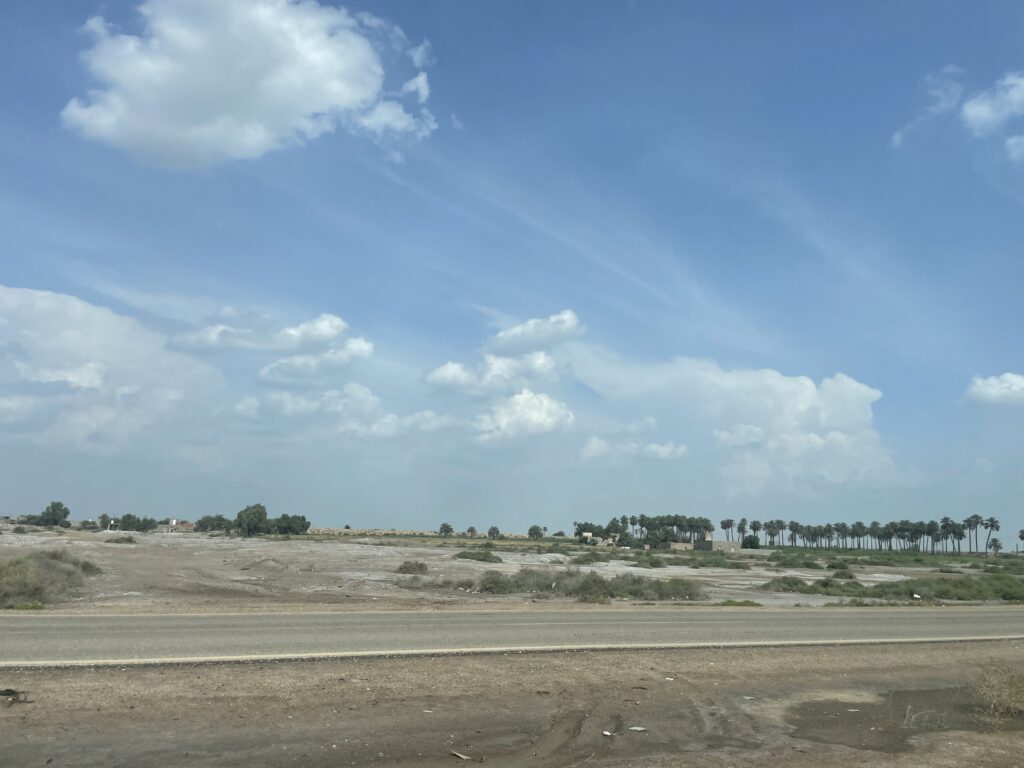
Amarah countryside, South Iraq, Fabrice Balanche 2024
The destruction of Iraqi cities
The catastrophic situation in the countryside in southern Iraq is driving the population to the cities. Pockets of poverty have developed around the large conurbations, but people from the rural areas also occupy the old, run-down city centres. This large population with its tribal culture is taking over land on the outskirts and building makeshift homes. They are counting on the support of political parties and tribal chiefs to stay put and obtain title deeds in the future. This creates tensions with the original urban dwellers, who do not tolerate cohabitation. The deterioration of public services, various forms of pollution and insecurity encourage the middle and upper classes to settle in gated communities. In Basra, a city of five million inhabitants, at least two million of whom live in the poverty belts, the number of closed neighbourhoods is increasing. There is a high demand for housing, and the dwellings are already reserved before they are built. Medium-sized towns such as Amara and Nasria are experiencing the same phenomenon. Often linked to property developers, local councils have little interest in improving the living conditions of urbanites and in encouraging them to lock themselves away in these reserved areas.
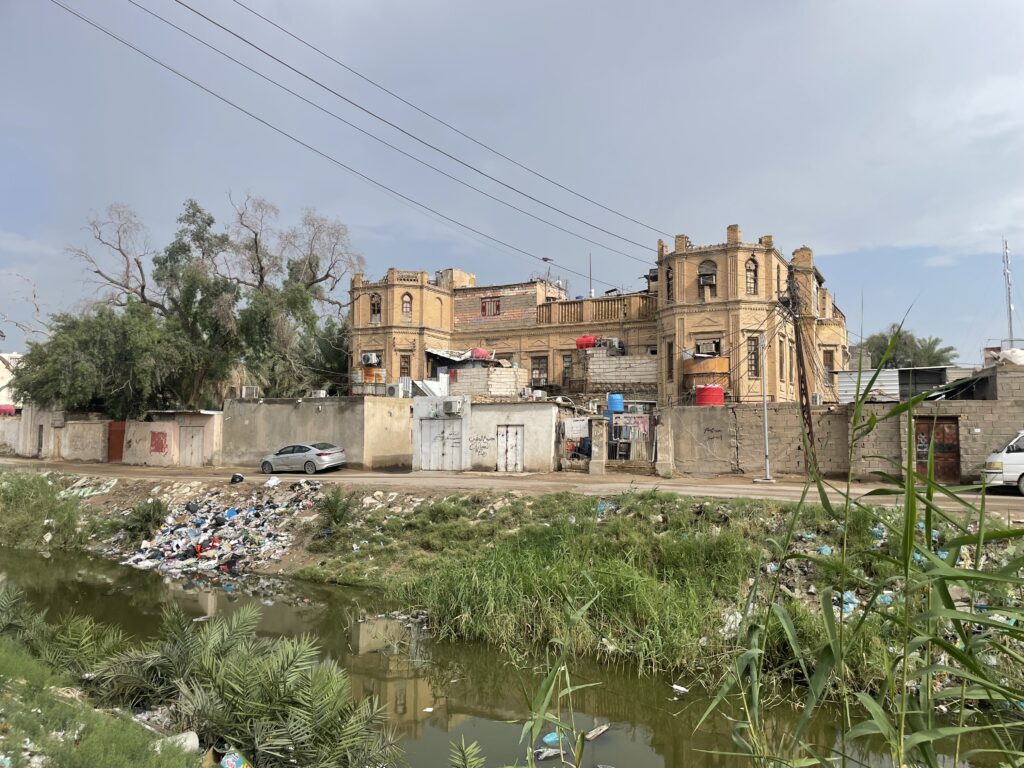
A squated villa in old Basra city, Fabrice Balanche 2024
But again, there is no climate change strategy in these modern neighbourhoods. Buildings could be constructed using insulating materials, but developers prefer to maximise their profits by using poor building supplies, which also leads to their rapid deterioration. Mosul’s reconstruction could have also been an opportunity to adjust housing to the new climatic conditions. The European Union funded part of the old city’s rehabilitation, but without controlling the quality of the buildings or requiring them to be adapted to the continental rigours of the Nineveh Plain. The opportunity to export European know-how in this field was therefore lost. As for the rest of Mosul’s historic centre, it awaits demolition to be replaced by a modern, futuristic building project that will not take into account the new situation. Iraq’s cities stretch as far as the eye can see in the form of vast American-style suburbs. They are based on the massive use of private cars and the consumption of space. This increases the energy consumption of urban housing and consequently the cost of living for the population. A sudden disruption in electricity supply and a rise in fuel prices will cause the model to collapse.
Conclusion
Rising temperatures and water shortages are Iraq’s major problems. The country’s resources should be dedicated to solving these two challenges. We need to adapt our habitat and manage the water scarcity. However, the solutions of providing abundant, virtually free electricity, and relying on massive food imports are short-sighted and counterproductive. This increases Iraq’s dependence on hydrocarbon exports and threatens its sovereignty. Iraq is squandering its wealth on consumption rather than investing in the future. The State will not be able to fulfil its rentier function for more than a few years. The rupture will be brutal, leading to the accelerated desertification of the arid zones where the population is artificially maintained. Forced migration will see the inhabitants of the South and West flocking to the North-East to seek a less hostile environment. This situation is bound to provoke conflict with the Kurds, as is already the case in disputed areas such as Kirkuk. Indeed, global warming will worsen existing tensions before creating new ones.


